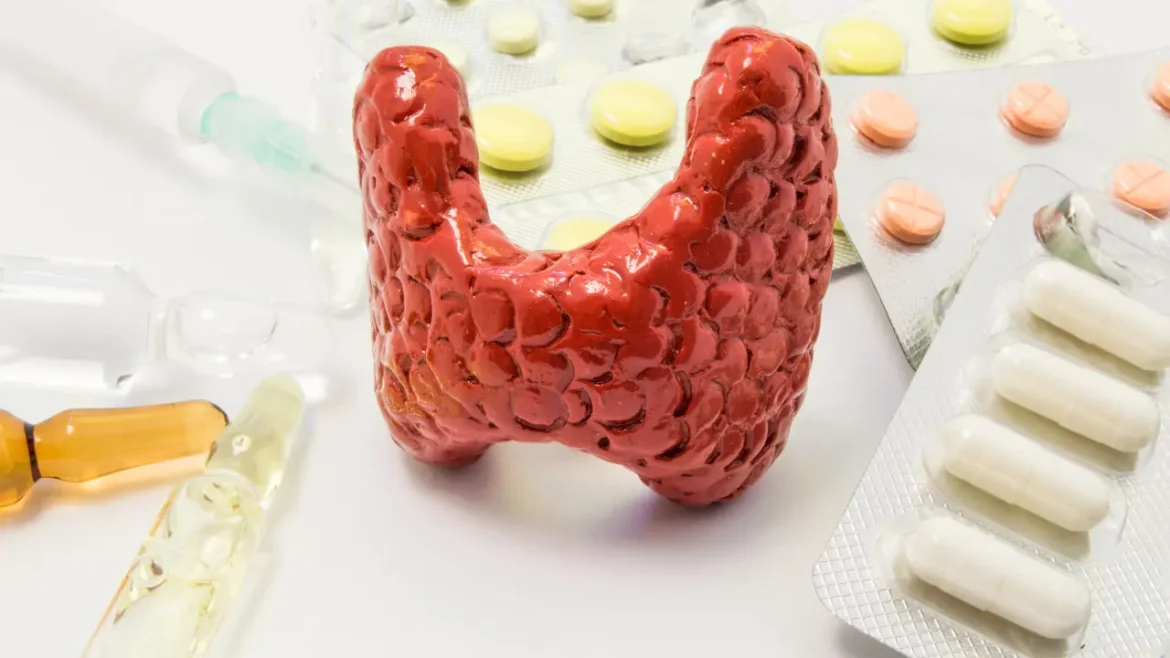Thyroid Disease and Your Skin: Description, Causes, and Treatment Protocol
Description
Numerous physiological functions, including growth, development, and metabolism, are crucially regulated by the thyroid gland. Hypothyroidism, hyperthyroidism, or overactive thyroid, can all be caused by thyroid malfunction. Thyroid hormone abnormalities can cause significant changes in the skin, even though it is not the main objective of thyroid disorders. Recognizing these skin symptoms is crucial for early identification, diagnosis, and treatment of thyroid diseases because thyroid disease may trigger a variety of skin effects. The imbalance of thyroid hormones, whether due to hypothyroidism or hyperthyroidism, can cause obvious modifications to the skin.
When the thyroid malfunction, the gland fails to produce sufficient thyroid hormones, and your skin will change such as dryness and roughness. It could look enlarged or swollen, and feel chilly to the touch. The skin’s capacity to retain moisture is hampered by a shortage of thyroid hormones, which also affects the generation of oil and the function of the skin barrier. Flakiness, scaling, and dryness might result from this. Hypothyroid patients may also experience hair loss, particularly on the scalp, brows, and outside corners of the hairline, along with hair thinning or loss. The skin can become more sensitive to bruising, and the nails can become more fragile and vulnerable to breaking conditions.
When the thyroid gland generates excessive thyroid hormones, a condition known as hyperthyroidism, several skin signs appear. Increased blood circulation to the skin from higher thyroid hormone levels might result in warmth and wetness. People who have hyperthyroidism may sweat excessively, especially on their hands and feet. The risk of the skin thinning and becoming delicate increases, making it more vulnerable to bruising and ripping. Other typical hair changes include excessive hair shedding and fine, fragile hair. There may also be nail anomalies, like fragile or ridged nails.
Particular skin conditions may be linked to thyroid dysfunction along with these generalized skin signs. Pretibial myxedema, an uncommon condition mostly found in people with hyperthyroidism, serves as one illustration. Pretibial myxedema gives you a waxy or lumpy physical appearance that usually occurs on the shins as it thickens and swells the skin.
You May Also Like:
CBD CONTRACT MANUFACTURER –TOP 5 BEST IN CLASS FOR 2022
BEYOND THE HYPE: HOW CBD CAN HELP SENIORS ENJOY A BETTER QUALITY OF LIFE
Thyroid Disease and Your Skin: Description, Causes, and Treatment Protocol is an original (HealthXWire) article.
Possible Causes
Many reasons can affect the skin symptoms of thyroid illness, whether it be hypothyroidism or hyperthyroidism: –
Autoimmune Disorders: Hypothyroidism is mainly caused by an autoimmune disease often known as Hashimoto’s thyroiditis. This disorder can result in the immune system attacking our thyroid gland. This causes inflammation and harm to the thyroid gland and results in skin alterations.
Hormonal Imbalance: Thyroid hormone imbalance represents the main factor contributing to skin abnormalities in thyroid illness. Reduced thyroid hormone synthesis in hypothyroidism may result in compromised skin barrier function, less perspiration and oil production, and decreased circulation to the skin. Contrarily, increased skin blood flow, excessive perspiration, and modified skin texture and integrity might occur as a consequence of the overproduction of thyroid hormones in hyperthyroidism.
Iodine Deficiency: For the creation of thyroid hormones, iodine is a crucial vitamin. The likelihood of getting thyroid disorder, especially hypothyroidism, is higher in areas with iodine deficiency. Lack of iodine can cause dryness along with other skin abnormalities, affecting the overall wellness of the skin.
Environmental Triggers: The onset or worsening of thyroid illness may be influenced by environmental factors, including exposure to specific poisons or chemicals. These catalysts could interfere with inherited tendencies or disturb the thyroid gland’s regular operation, which would therefore impact the structure of the skin.
Genetic Factors: People with certain hereditary conditions may be more prone to thyroid illness. The vulnerability to autoimmune thyroid illnesses and thyroid gland function may be affected by genetic mutations and modifications, which may also contribute to skin symptoms.

Exacerbating and Mitigating Factors
Several aggravating and mitigating factors can affect skin symptoms in thyroid illness: –
Exacerbating Factors: –
Thyroid Hormone Levels: Triiodothyronine (T3) and thyroxine (T4) affect the intensity of the skin symptoms. As previously stated, low thyroid hormone levels result in dry and rough skin. For people with hyperthyroidism, skin thinning, and other symptoms may occur.
Thyroid Function Control: Uncontrolled thyroid activity, either underactive or overactive, might lead to the recurrence or aggravation of cutaneous symptoms.
Poor Skin Care: Poor skin care techniques, such as using abrasive cleaners, neglecting to moisturize, and failing to guard against environmental variables, can exacerbate skin symptoms.
Environmental Factors: Extreme weather conditions, arid environments, or prolonged sun exposure can increase thyroid disease’s effects on the skin. These elements may also aggravate the skin’s dryness, inflammation, or sensitivity.
Mitigating Factors: –
Correct Thyroid Hormone Replacement: Thyroid hormone replacement medication administered properly can help hypothyroid patients’ hormone levels return to normal and reduce skin symptoms. For medication to have the desired therapeutic benefits, it is essential to work with a healthcare practitioner to optimize dosage and timing.
Maintaining Optimal Hydration: For healthy skin, enough hydration is crucial. It is possible to reduce dryness, enhance the general appearance of the skin, and increase its comfort by drinking enough water and applying moisturizers.
Stress Management: Stress can make skin issues worse and may even make thyroid disease skin symptoms worse. Reducing stress and enhancing general well-being through the use of stress-reduction techniques like relaxation treatments, exercise, or meditation might help, which may positively impact the skin.
Gentle Skin Care: For people with a thyroid condition, establishing a moderate skincare routine is crucial. Applying moisturizers frequently, avoiding abrasive exfoliants, and utilizing mild cleansers can all help calm the skin and reduce future inflammation.
Protection against Environmental Aspects: Skin symptoms can be lessened by taking the proper precautions to shield the skin from sunlight, severe temperatures, and other environmental variables. Hence, use more sunscreen, put on your UV safety gear, and stay out of the hot sun.


Standard Treatment Protocols
The goals of most thyroid disease management plans are to control the underlying ailment and return the levels of thyroid hormone to normal. Depending on whether a person develops hyperthyroidism or hypothyroidism, a specialized treatment strategy that involves the following: –
Hypothyroidism: –
- Replacement with Synthetic Thyroid Hormone
The injection of medications containing synthetic thyroid hormones, like levothyroxine, is the main treatment for hypothyroidism. This medicine helps to reduce symptoms, particularly skin signs, and restore normal thyroid hormone levels. Based on individual requirements and routine thyroid function monitoring, the dosage varies.
Hyperthyroidism: –
- Antithyroid Medications
Antithyroid drugs like propylthiouracil or methimazole can be used in instances of hyperthyroidism to stop the thyroid from producing hormones. These drugs work to reduce related symptoms, particularly skin manifestations, and bring thyroid hormone levels back to normal.
- Radioactive Iodine Therapy
When utilized to destroy thyroid cells specifically, radioactive iodine can be used to address hyperthyroidism. Symptoms are lessened and thyroid hormone generation is decreased thanks to this technique. The symptoms, including skin signs, might, however, require several months to go away.
- Thyroidectomy
Thyroidectomy is the surgical removal of the thyroid gland and hyperthyroidism may be treated with this option. Since the gland is entirely removed, lifetime thyroid hormone replacement therapy is needed.


Treatment Options
The following are some adjunct treatments that can be used in conjunction with regular ones to help reduce the cutaneous symptoms of thyroid disease: –
Sunscreen: In order to manage skin symptoms, it’s crucial to protect the skin from too much sun exposure. Broad-spectrum sunscreens containing a high SPF should frequently be used to reduce the possibility of skin sensitivity or irritation and prevent sun damage.
Moisturizers: Regular application of moisturizers can help reduce dryness, enhance the appearance of the skin, and make it more comfortable for individuals with hypothyroidism and hyperthyroidism. People should search for moisturizers that are mild, unscented, and appropriate for their skin types.
Nutritional Supplements: Nutritional deficits may occasionally be a factor in thyroid disease-related skin abnormalities. For optimal skin health and general well-being, a medical professional may suggest particular dietary supplements, like vitamin D, omega-3 fatty acids, or selenium.
Natural and Herbal Therapies: Several herbal treatments and natural cures could help manage skin symptoms as a supplemental benefit. Coconut oil, aloe vera gel, calendula, or chamomile lotions are a few natural therapies that could be helpful. Although herbal supplements, including bugleweed or ashwagandha, have been utilized historically, more research is needed to determine their effectiveness and safety.
However, to be assured they are secure and appropriate for your particular situation, it is crucial to speak with a healthcare practitioner before contemplating any supplemental treatment choices or herbal medicines. They must always be utilized in combination with accepted medical procedures and under a doctor’s supervision.


Conclusion
Thyroid disease is caused by thyroid hormone imbalance and it affects the skin texture, moisture levels, and appearance. Hyperthyroidism often comes with excessive sweating, itching, and increased sensitivity to temperature changes. Individuals with hypothyroidism normally suffer from skin dryness and thinning of the skin. A few of the possible causes of the development of thyroid disease include people with autoimmune disorders, hormonal imbalance, iodine deficiency, and others.
This disease should not be taken lightly and proper management of thyroid disease, under the guidance of a healthcare professional is essential. People with hyperthyroidism need to take antithyroid medications and have to get thyroidectomy or radioactive iodine therapy to contain this disease. While natural herbal therapies can serve as a good complement, patients should also seek advice from doctors to receive the best treatment plan that works for them.
Additional resources for further reference
https://www.aad.org/public/diseases/a-z/thyroid-disease-skin-changes
https://www.ncbi.nlm.nih.gov/pmc/articles/PMC3219173/
https://www.news-medical.net/health/Thyroid-Disorders-and-Skin-Problems.aspx
https://www.verywellhealth.com/thyroid-disease-symptoms-3233221
Important Note: The information contained in this article is for general informational purposes only, and should not be construed as health or medical advice, nor is it intended to diagnose, prevent, treat, or cure any disease or health condition. Before embarking on any diet, fitness regimen, or program of nutritional supplementation, it is advisable to consult your healthcare professional in order to determine its safety and probable efficacy in terms of your individual state of health.
Regarding Nutritional Supplements Or Other Non-Prescription Health Products: If any nutritional supplements or other non-prescription health products are mentioned in the foregoing article, any claims or statements made about them have not been evaluated by the U.S. Food and Drug Administration, and such nutritional supplements or other health products are not intended to diagnose, treat, cure, or prevent any disease.
Table of Contents


